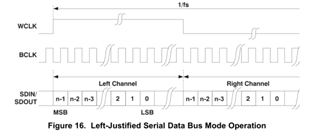Other Parts Discussed in Thread: TLV320AIC3106, OMAPL138
This is a follow up to my previous question regarding attaching multiple microphones with the 6748LCDK. Here (link), I was suggested to try accessing two mics by using the stereo microphone jack J11. I was told that I can attach two microphones easily to this jack- MIC_RIGHT (MIC3R) and MIC_LEFT (MIC3L) - and that I will be able to record from both mics simultaneously and play them back separately.
I have tried attaching two microphones to J11 via an audio jack (one mic connected to the left channel input of the jack and the other to the right). I am using the Mcasp example code in the processor sdk RTOS to get the samples of the audio. However, there is no way for me to know which samples are coming in from MIC3R and which ones from MIC3L. Therefore, I am not able to play them back separately. Could someone from the team please help out with this soon?


